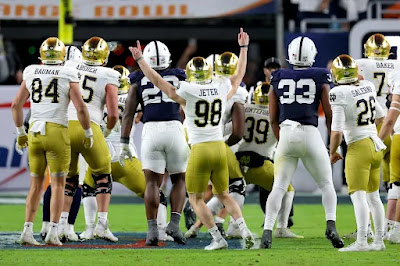When students walk into my classroom in a shirt and tie, or wearing their varsity jacket, I take notice. That simple gesture of coming to school in formal attire sends a message of its own: it's game day. I like that they make the effort to dress up and make it known that today isn't just another day. That tradition invites questions and sparks conversation. Who are you playing today? Where is the game? How are you feeling— nervous? Excited? How are the Lancers this year? Beat the Bells!
Sign value goes a long way.
Earlier this week, I paused when I realized that one of my students—a varsity athlete— came to class sans tie. Fifteen minutes prior, I saw one of his teammates in game day gear. Somewhat surprised and slightly confused, I asked him, "Why aren't you wearing a tie?" He said "my coach doesn't care if we wear one or not." I don't know his coach well enough to find out if this is true. I replied "But you're a senior, and, you're a starter. Don't you care?"
Sign value speaks for itself.
James Martin, SJ writes about sign value. "Sign value" refers to the meaning or significance a particular object, action, or event holds as a visible representation of a deeper spiritual truth or message. Sign value acts as a marker or indicator pointing towards more...something beyond. In a religious context, it's important for sign value enables people to connect with their faith through concrete symbols, tangible objects and more.
 |
| Fans loved who Charles Du included his name... |
Catholic spirituality finds sign value in and outside of church—in the day to day as well as time and space which is sacred and holy. Sign value is important because we are always seeking to convene and connect, understand and make known who we are and what we value. Sign value allows us to anchor those truths. For an athlete to wear a tie or a varsity jacket might seem nominal, but it's a place to start—and that is not to be underestimated.
Sign value can shape a community and define it. And good leaders recognize its import.
Every coach (and leader) needs examples to call out and credit. They need tried and tested ways that work. It helps to call on cases that demonstrate what they value and who they want to be. For instance, the Notre Dame football team does not put surnames of on the back of a player's jersey. The rationale for this tradition is that the team is important; the name of that team is what matters, and that can be found on the front of the jersey only.
 |
| Notice what the post-season brought...for one team. |
Notre Dame isn't the only program with this practice. The Nittany Lions of Penn State do the same. And during the Orange Bowl, I couldn't help notice, they kept this tradition whereas the Irish did not. (In both the Shamrock Series as well as post-season play, Notre Dame adds names to the jerseys. I have to wonder if the players love it. I know I do). I want to give credit where credit is due. Whether it's season or postseason—Penn State can say they hold sign value in the same way. To Coach Franklin, I would say: you—the team—know who you are and what you're about. I applaud you for that. This is not a criticism of Notre Dame; I appreciate both ways of holding sign value.
 |
| to their credit... |
For Notre Dame, I can point to other examples that signify the importance of team over individual performance. In April 2017, the University installed its first major video display system in Notre Dame Stadium. What fans, players and coaches were privy to see changed dramatically. And yet, no one will see individual profiles our promos. The focus remains on the team. That's sign value of the digital kind.
Whether is wearing a tie on game day or not wearing your name on your jersey, what we wear, carry, promote and portray has significance. It's not just something on the surface. It offers sign value, and sign value invites us to consider something more. This is the space the spiritual life is always inviting us into...


No comments:
Post a Comment